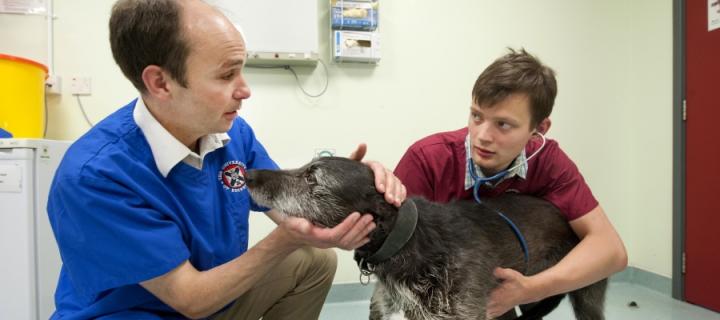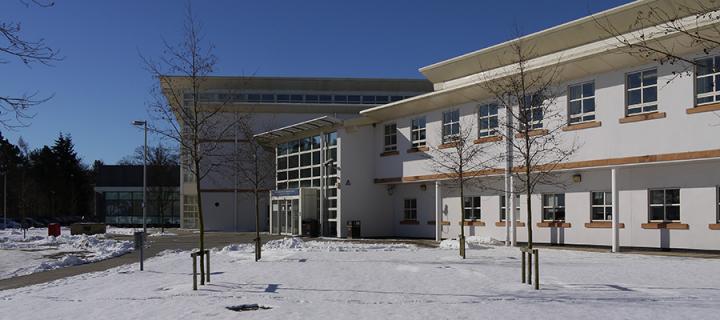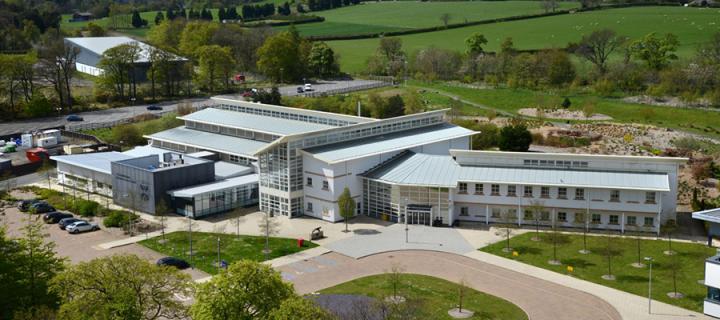Looking back at an exceptional year of veterinary care
Throughout the pandemic, veterinary staff have worked tirelessly to ensure the wellbeing of the creatures that share our lives. In this article, we look back at a year of exceptional veterinary care at the Dick Vet.

The Royal (Dick) School of Veterinary Studies is one of the University's oldest schools. Over the past twelve months, the pandemic has brought new challenges to the essential work of the School, on which so many rely for education, research and clinical care.
Within the wider University of Edinburgh and at the School, we have undertaken world-changing research into Covid-19, impacting policy and practice, as well as providing support to front-line NHS staff in their efforts to fight Coronavirus. Across all of our veterinary clinical facilities, staff have worked tirelessly to ensure that we are able to provide care to the animals that need it.
The School has also continued to provide essential welfare for animals and ensure the safety of the food chain through our farm animal vets. Our three clinical veterinary hospitals and three practices have remained open throughout the pandemic. This has required a great deal of flexibility. Realigning large veterinary hospitals and clinics to different ways of working has been a unique challenge, but one the staff are well positioned to meet.
We are guided by the University of Edinburgh, the Scottish Government and the Royal College of Veterinary Surgeons (RCVS) in how we work and train our students. Within these requirements, we have always prioritised animal welfare, public health and the staff and students working at the School.
Veterinary practice has significant, long-term national importance, so ensuring that the students under our care are able to complete their studies and join the workforce is essential.
In August of 2020 we were delighted to be able to welcome back much of our student body, whose RCVS certification relies upon clinical experience. Like other areas of the University, we have moved all possible teaching online, but a key part of the veterinary degree is hands-on learning in our clinical hospitals, and we were able to put in place a range of measures so that our students could safely continue their training.
We are also mindful that our vets, nurses and support staff have families, and are impacted by schools and nurseries closing, among other caring responsibilities. The University of Edinburgh has put in place policies to ensure that staff are able to protect and look after their loved ones, and we are proud to have supported this to the fullest extent.

What does life in our veterinary hospitals look like now?
As anyone who has visited a veterinary hospital during the pandemic will know, some changes have been made to the practical aspects of veterinary care, such as client engagement. We have embraced technology where possible, using alterative forms of communication such as video chats. We ask clients attending any of our hospitals and practices to declare symptoms before booking an appointment that someone else brings their pet to us if they are unwell. The clients are met in the car park and generally remain outside of the buildings, with their animals being taken into our care from there.
As the pandemic has progressed, the Royal College of Veterinary Surgeons (RCVS) has provided guidance for all vets, which has provided an excellent set of standards for safety measures.
At all times, our guiding principles have been to ensure animal safety and welfare, but this has created some challenges, including a decreased caseload in the spring followed by a backlog of pressing cases. Many cases that are not initially emergencies may become so if not treated, so each is evaluated to judge the potential impact on animal welfare. We are grateful to all of our clients for their patience and support through these difficult times.
In the Dick Vet Equine Practice, vets will generally travel to visit their patients, allowing for social distancing to be observed on site. In the Dick Vet Equine Hospital, cases are referred to us from across Scotland and even the North of England, and clients bring their animals to the Hospital for care. These cases are often urgent with welfare issues that are not able to wait and so have continued throughout the pandemic.
Our Farm Animal Practice vets have continued their work to maintain the food chain, supporting farmers and keeping the animals we rely on healthy. The average cow is about 2m long, allowing a natural measure for social distancing, with a farmer at one end and a vet at the other! Most of the work is outside or in well-ventilated agricultural buildings, which enables our vets and clients to work in safety.

The Hospital for Small Animals is a referral hospital with specialists who are able to see cases of every kind, from behavioural problems to cancer. It is also home to the Dick Vet General Practice, which has clients across Midlothian, Edinburgh and further afield. Both the Hospital and Practice have continued to work and provide essential care for animals. We have measures in place so that no matter what disruptions happen outside the Hospital, be it pandemics or snow, we will always be ready to provide care for animals that need us.
While the current situation is new to us all, vets are experts at monitoring and avoiding infection. We have been able to call upon that expertise to adopt a wide range of measures to keep staff and students safe. This included early adoption of face coverings, increased cleaning of vehicles and other equipment, and expanding our existing network of hand cleaning stations.
We’ve also adopted one-way systems in all buildings, optimised staff groupings, held clinical rounds virtually and even brought in more kettles for rest areas!
Despite the challenges they have faced, staff and students have responded with understanding, grace and steadfast commitment to our patents, clients, referring vets and each other. No matter what, the Dick Vet will remain a family and will continue to look after one another.
About the Royal (Dick) School of Veterinary Studies
The Royal (Dick) School of Veterinary Studies is a one-of-a-kind centre of excellence in clinical activity, teaching and research. Our purpose-built campus, set against the backdrop of the beautiful Pentland Hills Regional Park, is home to more than eight hundred staff and almost fourteen hundred students, all of whom contribute to our exceptional community ethos.
The School comprises:
- The Roslin Institute
- The Global Academy of Agriculture and Food Security
- The Roslin Innovation Centre
- The Hospital for Small Animals
- Equine Veterinary Services
- Farm Animal Services
- Easter Bush Pathology
- The Jeanne Marchig International Centre for Animal Welfare Education
We represent the largest concentration of animal science related expertise in Europe, impacting local, regional, national and international communities in terms of economic growth, the provision of clinical services and the advancement of scientific knowledge.


